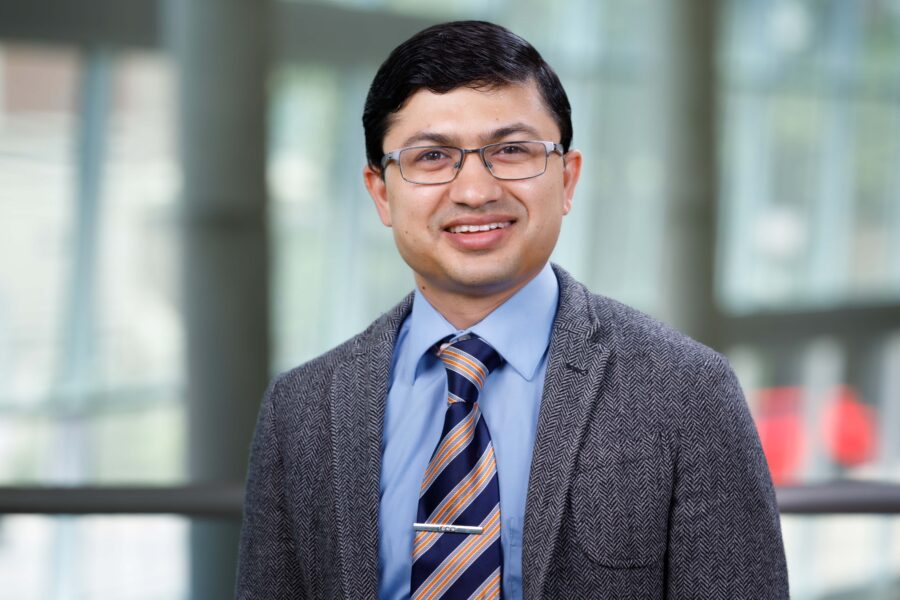For Vijaya Bhatt, MBBS, “the cure can be worse than the disease” is more than an old saying. It’s a challenge.
Dr. Bhatt, associate professor and medical director of the leukemia program in the UNMC Division of Hematology and Oncology, has seen older patients diagnosed with acute myeloid leukemia who do not get possibly lifesaving treatment because of the potential effects of the chemotherapy on physical and cognitive function, and quality of life.
Now, with the support of a multidisciplinary team, he’s just received a $2.6 million, five-year grant from the National Cancer Institute to see if he can change that.
In his ongoing study, “Resilience in Older Adults with Leukemia Receiving Initial Treatment (ROAR-1),” Dr. Bhatt will investigate how the use of the drug Venetoclax, in combination with low-intensity chemotherapy, affects older patients’ cognitive and physical function, functional independence and quality of life during treatment and after their leukemia goes into remission. The study also will examine changes in the electrical activity of brain networks that control cognitive function.
“People want to know – not just survival data – but also how are they going to feel and function during and after treatment. Is treatment going to affect their cognition? Are they going to lose their independence? Such information gives them an idea about whether the treatment is worth it.
“With intensive chemotherapy, the concern among older patients can be that even if you achieve remission, the toxicity from those intensive chemotherapies is such that your quality of life, and physical and cognitive function is poor. Patients may lose independence, and it’s also possible they may not recover their baseline health and well-being.”
Venetoclax is used in combination with low-intensity chemotherapy, Dr. Bhatt said.
“Low-intensity chemotherapy is not a new treatment, but adding Venetoclax doubles the response rate. It provides a treatment option that could be just as good as intensive chemotherapy for many older patients, particularly for patients who have a lot of health problems or are already frail at the time of diagnosis.
“Prior studies show that Bcl-2 proteins may have a protective role against brain aging, neuronal cell death and axonal degeneration. Venetoclax targets B-cell lymphoma 2 (Bcl-2) proteins and has potential to affect brain networks and cognitive function.”
“But if you can control leukemia, that would have a net positive impact on the brain network,” he said. “Cognitive function could improve from baseline at the time of diagnosis of leukemia, and better cognitive function can favorably impact functional independence as well as quality of life.”
“Even if you’re not feeling well at the time of diagnosis of leukemia, following a response to treatment, your quality of life and your function may improve,” Dr. Bhatt said. “Demonstrating that treatment can be well tolerated even among patients with many health problems would encourage older patients to carefully consider treatment for their underlying leukemia, rather than saying ‘I’m not doing well, so it’s not worth it to receive further treatment.’”
The study will be conducted in seven centers nationally, with UNMC as the lead center. It will enroll a total of 334 participants, including the control group without leukemia, and will be completed in 2028.
There are 13 investigators involved in the proposal, including six from UNMC. The R01 grant application was converted to a highly coveted Method to Extend Research in Time (MERIT) or R37 Award, which is administratively selected by the NCI out of the most highly ranked R01 applications and provides an opportunity for an extension of up to two additional years of funding.
“Our multidisciplinary UNMC team includes expert investigators from oncology, geriatrics, neurological sciences and statistics. The multicenter investigators are renowned leukemia oncologists in the country. Having a rich multidisciplinary team, supportive mentors and research staff and multicenter participation were key to obtaining this grant. And more importantly, this study will provide answers to important questions that matter to older patients with leukemia,” Dr. Bhatt said.
